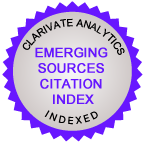Distance learning during and after COVID-19: reality and challenges
-
Salma Moutaouakkil
 moutaouakkil.salma@gmail.com
moutaouakkil.salma@gmail.com
Downloads
DOI:
https://doi.org/10.56754/0718-4867.2024.3678Abstract
First, we examine the impact of COVID-19 on the Moroccan education system and the many challenges it has created for the Moroccan educational community to guarantee pedagogical continuity in terms of internet connection, pedagogical approach, and the generation of hybrid learning strategies, which combine face-to-face and online work. Secondly, we offer some essential ingredients in digital teaching, such as the new current pedagogical trends based on the use of platforms, specific educational software, and different ICT resources, which are considered modern and essential tools to research and create learning spaces, through the network, applicable to any educational level and always adapting the theme to the contents of the program and the student's profile. Below, details provide the national context and the proposed recommendations for the promotion of education, science, and culture, which represent a priority of the Moroccan government and an important lever to achieve sustainable development goals.
Palabras Clave
Benkaraach, T., Benabdelouahed, R., Belafhaili, M., Dafir, A., Nefzaoui, A., & El- marhoum, A. (2020). Continuité pédagogique et enseignement à distance en période de confinement : Perception et satisfaction des acteurs. researchgate.net. https://www.researchgate.net/publication/343682049_Continuite_pedagogique_et_enseignement_a_distance_en_periode_de_confinement_Perception_et_satisfaction_des_acteurs
Churches, A. (2008). Bloom’s digital taxonomy. researchgate.net. https://www.researchgate.net/publication/228381038_Bloom's_Digital_Taxonomy
Douieb, M. M. (2021). La integración de las TIC en la Universidad marroquí: aproximación pedagógica. Communication papers, 10(20), 101- 117. https://raco.cat/index.php/communication/article/view/391105
Ortega-Nogales, T. (21 de enero, 2021). Una segunda oportunidad para la educación en Marruecos. El país. https://elpais.com/planeta-futuro/2021-01-20/una-segunda-oportunidad-para-la-educacion-en-marruecos.html
Ortiz, J. (15 de noviembre, 2021). Los retos del futuro de la educación digital en Marruecos. Atalayar. Entre dos orillas. https://www.atalayar.com/articulo/sociedad/retos-futuro-educacion-digital-marruecos/20211115150112153766.html
Parra-Giménez, F. (2017). La Taxonomía de Boom en el modelo Flipped Classroom. SEMANTIC SCHOLAR. https://www.semanticscholar.org/paper/La-Taxonom%C3%ADa-de-Bloom-en-el-modelo-Flipped-Gim%C3%A9nez-Jes%C3%BAs/239a02a2ee015b6e36afce6f1ce952ab8b395146
Pérez-García, Á. (2021). Retos y desafíos de la educación post pandémica. Aula De Encuentro, 23(1), 1-4. https://doi.org/10.17561/ae.v23n1.6246
Similar Articles
- Francisco Javier Alonso-Flores, Carolina Moreno-Castro, Antonio Eleazar Serrano-López, Researchers‘ age, gender and professional status as indicators of the Twitter perception in science dissemination , Perspectivas de la Comunicación: Vol. 12 No. 1 (2019): January - June
- Eduardo Raíces, From the secret Argentina to youth emergence. Cultural analysis and politics in the Peronist magazine Línea (1980-1982) , Perspectivas de la Comunicación: Vol. 13 No. 2 (2020): July-December
- Andrea Cueva Villamarín, Social media and economic disinformation: impact on digital citizenship , Perspectivas de la Comunicación: Vol. 18 (2025): (Publishing on a rolling basis)
- Javier Abuín-Penas, Claudia Montero Liberona, How does the Chilean Ministry of Health communicate about cancer? Analysis of Facebook and Instagram posts from 2018 to 2023 , Perspectivas de la Comunicación: Vol. 16 No. 2 (2023): July - December
- Natalia Raimondo Anselmino, Alejandro Sambrana, Ana Laura Cardoso, José Rostagno, Paratextual and paralinguistic resources in the fanpages of the Argentine newspapers Clarín and La Nación. Attributes of press discourse in social networking sites , Perspectivas de la Comunicación: Vol. 12 No. 2 (2019): July - December
- Montserrat Vidal-Mestre, Alfonso Freire-Sánchez, Maria Fitó-Carreras, The journalistic discourse and the elements of message transmission in the podcast and the audiovisual docuseries of true crime. The case of El asesino de la baraja , Perspectivas de la Comunicación: Vol. 17 (2024): January - December
- Alfonso Chaves-Montero, Walter Federico Gadea-Aiello, José Ignacio Aguaded-Gómez, The political communication on social networks during the 2015 electoral campaign in Spain: usage, effectivity and reach , Perspectivas de la Comunicación: Vol. 10 No. 1 (2017): Enero - Agosto
- Andrea Langbecker, Daniel Catalan Matamoros, Social media and COVID-19 vaccination: Analysis of user behavior in Spain , Perspectivas de la Comunicación: Vol. 16 No. 2 (2023): July - December
- Noelia Cejas, Aportes a la comprensión de procesos de comunicación en prácticas de co-construcción interactoral de tecnología social. , Perspectivas de la Comunicación: Vol. 6 No. 2 (2013): Setiembre – Diciembre
- Alfredo Arceo Vacas, Rafael Barberá González, Sergio Álvarez Sánchez, The context of perception generated on Twitter for the Spanish electoral debates of December 2015 and June 2016: treatment of the credibility factors by the candidates , Perspectivas de la Comunicación: Vol. 13 No. 2 (2020): July-December
You may also start an advanced similarity search for this article.
Downloads
Published
How to Cite
Issue
Section
License
Copyright (c) 2024 Salma Moutaouakkil

This work is licensed under a Creative Commons Attribution 4.0 International License.
- Proposed policy to offer Open Access Journals
Authors who publish with this journal agree to the following terms:
a) Authors retain copyright and grant the journal right of first publication with the work simultaneously licensed under a Creative Commons Attribution Attribution (CC -BY 4.0) ![]() that allows others to share the work with an acknowledgement of the work's authorship and initial publication in this journal.
that allows others to share the work with an acknowledgement of the work's authorship and initial publication in this journal.
b) Authors are able to adopt licensing agreements for the non-exclusive distribution of the journal's published version of the work (for example, to post it to an institutional repositories or publish it in a monograph), with an acknowledgement of its initial publication in this journal.
c) Authors are allowed and encouraged to post their work online (For example, in institutional repositories or on their website) prior to and during the submission process, as it can lead to productive exchanges and increase the citation of published work (See The Effect of Open Access).











